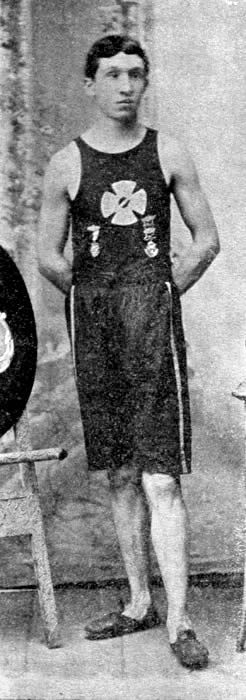As a lifetime Bostonian who has seen her share of snowstorms (especially this year), I always look forward to Patriot’s Day (April 20 this year). It’s the official anniversary of the Battle of Lexington and Concord—which is re-enacted very early in the morning—but it’s also the unofficial first day of spring, signaled by the running of the Boston Marathon.
In honor of my favorite state holiday, I decided to research the life and family history of the first Boston Marathon winner, John J. McDermott. I assumed it would be easy— he won the first Boston Marathon, for goodness’ sake; there must be tons of literature about his life, right? Wrong! After he won that first Boston Marathon in 1897, John J. McDermott seemed to disappear from records. I searched newspapers and obituaries, read histories of marathon runners, and contacted local libraries, but I could not uncover evidence of what happened to him.
According to period newspapers, McDermott was an avid long-distance runner from the Pastime Athletic Club of New York City. He won the first marathon ever run on American soil, the New York City Marathon, in 1896, the year before he won the Boston Marathon. An Irish Immigrant, he was born about 1880, and worked as a lithographer in New York. While McDermott should have been a celebrity at the time, newspapers and marathon histories did not include any information about his personal life: no date of birth, date of death, names of wife, children, or other family members. In fact, newspapers did not even specify the New York borough where he lived.
Complicating this lack of information in official marathon coverage were a few other problems:
- John J. McDermott is a very common name.
- New York City is a big place.
- If I were to locate a particular John J. McDermott, how would I then tie him to the John J. McDermott who won the Boston Marathon?
I tried to narrow down the possibilities through city directories and census records, as John J. McDermott, lithographer, was an easier target. And, while I found a possible entry in the 1910 U.S. Census (John J. McDermott, 113 East 12th Street, born Ireland about 1876, occupation printer),[1] I was unable to locate any other identifiable information.
 Detail of 1910 census showing John J. McDermott (No. 81)—but is it the Marathon winner? Click to enlarge.
Detail of 1910 census showing John J. McDermott (No. 81)—but is it the Marathon winner? Click to enlarge.
My search for John J. McDermott has revealed two painful truths about genealogy. (1) Sometimes people cannot be found using traditional records. Whether they died in poverty, without family, or came from a disenfranchised group, records of their lives did not survive. We can use only the records we do have to make a reasonable assumption about their lives or locate descendants with more information. (2) Even well-known people can be forgotten. This is a truth that genealogists know well. One of the great rewards of genealogical research is the ability to save a person from obscurity, to resurrect their forgotten life and accomplishments.
I am following up on a few leads with John J. McDermott, one with the Rockefeller Institute and the other with a person on Facebook who claims to be a descendant, so perhaps one day I will have more information about him. Until then, let’s all remember his first-place finish this Marathon Monday and save him from being forgotten.
Notes
[1] Mary Nixon household, 1910 U.S. Census, Ward 17, Manhattan, New York County, N.Y., roll 1034, ED 931, p. 12B.
Share this:
About Lindsay Fulton
Lindsay Fulton joined the Society in 2012, first a member of the Research Services team, and then a Genealogist in the Library. She has been the Director of Research Services since 2016. In addition to helping constituents with their research, Lindsay has also authored a Portable Genealogists on the topics of Applying to Lineage Societies, the United States Federal Census, 1790-1840 and the United States Federal Census, 1850-1940. She is a frequent contributor to the NEHGS blog, Vita-Brevis, and has appeared as a guest on the Extreme Genes radio program. Before, NEHGS, Lindsay worked at the National Archives and Records Administration in Waltham, Massachusetts, where she designed and implemented an original curriculum program exploring the Chinese Exclusion Era for elementary school students. She holds a B.A. from Merrimack College and M.A. from the University of Massachusetts-Boston.View all posts by Lindsay Fulton →
